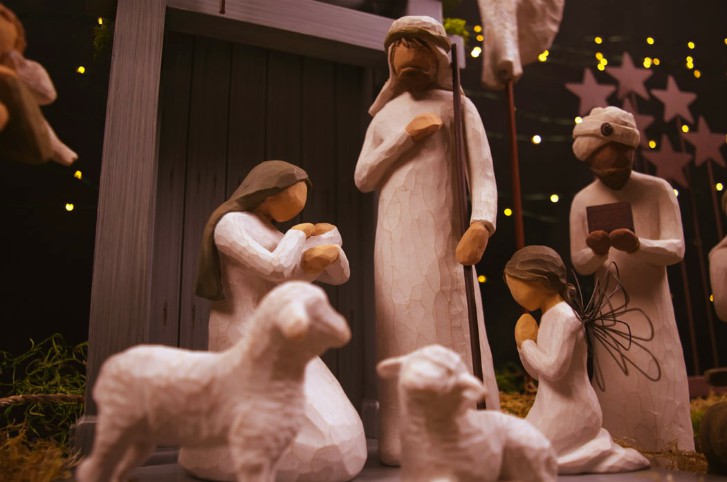Happy Christmas. Happy Hanukkah. Happy Kwanzaa…Happy holidays! From Thanksgiving through the New Year, Americans celebrate.
They celebrate cultural holidays, religious holidays and a plethora of traditions to go along with both. For many, the traditions themselves have become as sacred as the holidays that inspired them. This year, Barna Group conducted a survey of Americans’ holiday practices: from what they celebrate, to how they celebrate, to the ways technology is impacting those celebrations.
The Reason(s) for the Season
The holidays have become as much a cultural tradition as a religious one, but seven in 10 adults say they still primarily celebrate for religious reasons (70%). Nine in 10 Americans celebrate Christmas (91%), while 2% celebrate Hanukkah and 1% observe Kwanzaa. Other holidays Americans say they celebrate during this season include New Year’s (6%) and birthdays or anniversaries (1%). About one in 20 say they don’t celebrate any holidays during December (6%).
For most Americans, the holiday season is about going home—or bringing family home to them. Nearly three-quarters say spending time with family is what makes the holiday season fulfilling (72%). Just over one in 10 say connecting with Jesus or God is how they find fulfillment during this time (13%). Smaller proportions point to giving and receiving gifts (7%), good health (6%), going on vacation or relaxing (5%), financial or material gain (4%), donating or serving the needy (3%), peace in the world or people being kind to one another (2%), good food (1%), snow (1%) and peace at home (1%).
Phone (or Text . . . or Skype) Home
While spending time with family is a treasured part of the season, not everyone can make it home for the holidays. So how will Americans connect with far away friends and family members on Christmas Day? Most people say they will take time to place a phone call; more than eight in 10 say they are likely to phone absent friends or family members (82%). Calling is the most popular option across the board for all generations: Millennials are just as likely (81%) as Gen-Xers (80%) and Elders (81%) and only slightly less likely than Boomers (84%) to pick up the phone on Christmas Day.
About half of all adults expect to text a friend or family member on Christmas (53%). The proportion is much larger among Millennials, three-quarters of whom plan to text someone (73%). Predictably, the percentages decrease among each older generation: 64% of Gen X-ers, 46% of Boomers and 18% of Elders expect to text someone a holiday greeting on Christmas.
Facebook is another popular way for people to send Christmas cheer. Nearly four in 10 adults (38%) expect to connect with a friend or family member via the social network on Christmas. Millennials are mostly likely to say they will do so (46%), followed by Gen-Xers (51%), Boomers (31%) and Elders (13%). Connecting with absent friends and family members via Skype follows a similar pattern: About one-quarter of adults (23%) expect to Skype on Christmas, including 39% of Millennials, 21% of Gen-Xers, 19% of Boomers and 11% of Elders.
From grouchy Mr. Scrooge to crazy Uncle Eddie, there are some characters not everyone wants to see on Christmas. When Barna Group asked Americans if they have any family members they would prefer to connect with virtually on Christmas (via Facebook, text or phone) instead of in person, about one-quarter of adults (27%) said yes. Gen-Xers are most likely to agree with the statement (35%) and Elders least likely (17%), while Millennials (24%) and Boomers (25%) are near the general population.
Check Your Email
Technology has broken into nearly every aspect of life in the 21st century, and the holiday season is no exception. But it hasn’t made the dent one might expect when it comes to virtual giving. For example, very few people, no matter their generation, plan to give virtual gifts such as a digital gift card. Only 14% of adults plan to do so, and the percentages is similar among all age segments (Millennials 15%, Gen-Xers 13%, Boomers 15%, Elders 15%).
Similarly, technology hasn’t significantly impacted the long-standing tradition of sending Christmas cards. Only 2% of all adults plan to send Christmas cards digitally this year. In fact, Americans are much more likely not to send cards at all than to send digital greetings: Four in 10 plan not to send Christmas cards this year (41%). As might be expected, Millennials are most likely to say they will not send Christmas cards (62%), followed by Gen-Xers (42%), Boomers (31%) and Elders (21%). About half of all adults (52%), on the other hand, will pay postage to send Christmas greetings the old-fashioned way. These include three in 10 Millennials (31%), about half of Gen-Xers (47%), two-thirds of Boomers (63%) and more than seven in 10 Elders (72%).
The one holiday tradition technology has significantly affected? Shopping. About half of U.S. adults (48%) plan to do at least some of their holiday shopping online this year. About one in 20 (5%) plan to do all of it online, while just under half (46%) say they won’t do any online shopping. As with other digital trends, the younger the person, the more likely he or she is to go virtual. Six in 10 Millennials (60%) say they will do some and 7% say they will do all of their shopping online; only about one-third (32%) plan not to do any online gift-buying. Similarly, nearly six in 10 Gen-Xers (56%) will do at least some online shopping, while 47% of Boomers plan to do so. The generational difference is most significant when it comes to Elders: Only 15% of Americans 69 and older say they will do some online shopping, while about eight in 10 (82%) say they won’t buy any gifts online this year.
In contrast to the increasing popularity of online shopping, technology has made less of an inroad when it comes to religious traditions surrounding the holidays. For example, this year, one-quarter of adults (25%) plan to listen to a sermon or religious message via podcast during the holiday season.
What the Research Means
“Whether or not you are religious, the holidays are all about traditions,” says Barna vice president Roxanne Stone. “And traditions, by their nature, are old and unchanging. They are passed down from generation to generation and, along the way, become treasured. Even our songs laud the joys of an ‘old-fashioned Christmas.’ This time of year, people take pride in and long for the warmth and romance of the past: They break out heirloom decorations, they bake cookies from scratch, they listen to songs recorded 75 years ago. And they hand-address and stamp envelopes to send what may be the only snail mail they send all year. It makes sense that technology hasn’t infiltrated this part of our lives quite as much as every other part.
“Of course, convenience sometimes wins out,” Stone continues. “Holiday shopping and holiday crowds do not always go hand-in-hand with holiday cheer. Thanks to offers of free shipping and daily deals throughout December, online shopping is increasingly appealing to gift buyers of all generations. And, while very few people are sending their Christmas cards digitally, many design and order their paper cards online via a growing number of customizable greeting card services.
“For most people, the holidays are about family, about being with your loved ones,” says Stone. “Even people who celebrate for religious reasons find the most fulfillment from being with family, over and above observing religious traditions. For Christians—who celebrate the birth of Christ, the incarnation of God—being physically present with loved ones resonates with the themes of Advent and Christmas. While a phone call or a text message are better than nothing, the gift of Christmas is presence—to be somewhere, in-person with family, no matter how difficult, awkward and tense that might be.”
All rights reserved. Used by permission.
A native New Yorker, George Barna has filled executive roles in politics, marketing, advertising, media, research and ministry. He founded the Barna Research Group (now The Barna Group) in 1984 and helped it become a leading marketing research firm focused on the intersection of faith and culture. The company has served several hundred parachurch ministries and thousands of Christian churches throughout the country. It has also supplied research to numerous corporations and non-profit organizations, as well as to the U.S. Navy and U.S. Army.
To date, Barna has written 48 books, mostly addressing leadership, trends, church health and spiritual development. They include best-sellers such as Revolution, Transforming Children into Spiritual Champions, The Frog in the Kettle, and The Power of Vision. His most recent book is Revolutionary Parenting. Several of his books have received national awards. He has had more than 100 articles published in periodicals and writes a bi-weekly research report (The Barna Update) accessed by more than a million people each year, through his firm’s website (www.barna.org). His work is frequently cited as an authoritative source by the media. He has been hailed as "the most quoted person in the Christian Church today" and has been named by various media as one of the nation’s most influential Christian leaders.
He is a popular speaker at ministry conferences around the world and has taught at Pepperdine and Biola Universities and several seminaries. Barna served as a pastor of a large, multi-ethnic church and has been involved in several church start-ups.
After graduating summa cum laude from Boston College, Barna earned two Master's degrees from Rutgers University. At Rutgers, he was awarded the Eagleton Fellowship. He also received a doctorate from Dallas Baptist University. He lives with his wife (Nancy) and their three daughters (Samantha, Corban, Christine) in southern California. He enjoys reading novels, watching movies, playing guitar, and relaxing on the beach.


